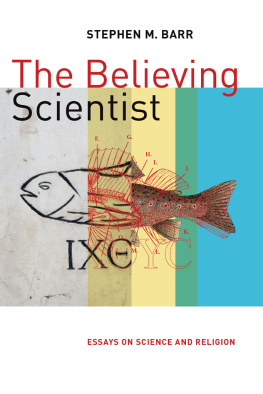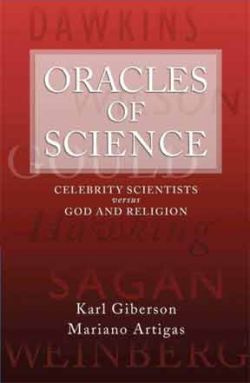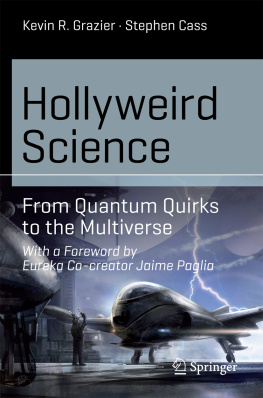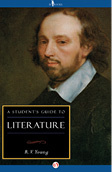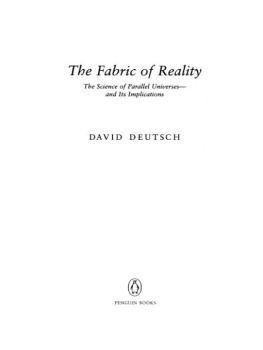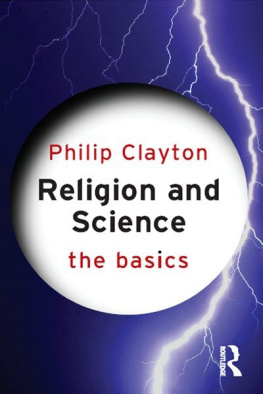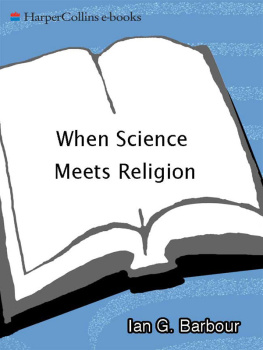The Believing Scientist
Essays on Science and Religion
Stephen M. Barr
WILLIAM B. EERDMANS PUBLISHING COMPANY
GRAND RAPIDS, MICHIGAN
Wm. B. Eerdmans Publishing Co.
2140 Oak Industrial Drive N.E., Grand Rapids, Michigan 49505
www.eerdmans.com
2016 Stephen M. Barr
All rights reserved
Published 2016
22 21 20 19 18 17 161 2 3 4 5 6 7
ISBN 978-0-8028-7370-5
eISBN 978-1-4674-4596-2
Library of Congress Cataloging-in-Publication Data
Names: Barr, Stephen M., 1953- author.Title: The believing scientist : essays on science and religion / Stephen M. Barr.
Description: Grand Rapids : Eerdmans Publishing Co., 2016. | Includes bibliographical references.
Identifiers: LCCN 2016033602 | ISBN 9780802873705 (pbk. : alk. paper)
Subjects: LCSH: Religion and science.
Classification: LCC BL240.3 .B376 2016 | DDC 201/.65dc23
LC record available at https://lccn.loc.gov/2016033602
CONTENTS
W e often hear of a conflict between religion and science. Is there one? Certainly, some religious beliefs are scientifically untenable: for example, that the world is six thousand years old. However, for Jews and Christians not committed to a narrowly literalistic interpretation of Scripture, that kind of direct and clearcut contradiction between scientific facts and religious doctrines does not exist.
What many take to be a conflict between religion and science is really something else. It is a conflict between religion and materialism. Materialism regards itself as scientific, and indeed is often called scientific materialism, even by its opponents, but it has no legitimate claim to be part of science. It is, rather, a school of philosophy, one defined by the belief that nothing exists except matter, or, as Democritus put it, atoms and the void.
However, there is more to materialism than this cold ontological negation. For many, scientific materialism is not a bloodless philosophy but a passionately held ideology. Indeed, it is the ideology of a great part of the scientific world. Its adherents see science as having a mission that goes beyond the mere investigation of nature or the discovery of physical laws. That mission is to free mankind from superstition in all its forms, and especially in the form of religious belief.
There are two grounds for the materialists indictment of religion as superstition. First, religion is supernaturalist. It teaches that there is a spiritual realm, and supposedly embraces mythological explanations and magical practices. Second, religion is (in the materialists eyes) irrationalist, because it is based on dogma, faith, and mystery. Science, being based on the natural and the rational, is therefore held to be fundamentally opposed to religion.
In other words, the scientific materialist maintains that there is a conflict between science and religion, and that it is intrinsic and a priori, in the sense that it would exist even if science had not yet made any definite discoveries about the world. This supposed opposition flows from what science and religion are in themselves, from their basic views of reality. However, the materialist claims more than this. He also says that many of the particular discoveries of science have demolished the credibility of religion. He claims, in other words, that there is also an a posteriori conflict between science and religion. This claim is based on a tendentious reading of scientific history, what I shall call the materialists Story of Science. According to this story, the great discoveries since the time of Copernicus and Galileo have disclosed a world that looks ever less like the picture religion painted of it, and have forced religious believers to fight a centurieslong rearguard action against the truth. Science has been the great debunker.
The claims of scientific materialism are hardly new. Indeed, they have not changed substantially in over a hundred years. And yet much else has changed in that time. We know much more than we did about the origins of science; we know vastly more about nature. It is a good time, therefore, to take a fresh look at the materialist ideology of science and its story of science to see how well they have held up in the light of new knowledge.
We begin with the issue of supernaturalism in religion and its supposedly superstitious character. I think we would all agree that most forms of belief in the supernatural are superstitious. However, we must remind ourselves of a vital historical fact, which is that many of these forms of supernaturalism were attacked, and at least partially overthrown, by biblical religion long before the advent of modern science. The Book of Genesis was itself in large part intended, scholars tell us, as a polemic against pagan superstition. For example, whereas the sun and moon were the objects of worship in pagan religion, the Book of Genesis taught that they were nothing but lamps set in the heavens to give light to day and night: not gods, but mere things, creatures of the one true God. Nor were animals and the forces of nature to be bowed down to by man as in pagan religion; rather man, as a rational being made in the image of God, was to exercise dominion over them.
It is true that the Bible is overwhelmingly supernatural in its outlook and literary atmosphere. However, what is critically important is that the Bibles supernaturalism is concentrated in a God who is outside of Nature, and radically distinguished from the world He has made. Therefore the world of nature is no longer seen as populated by capricious supernatural beings, by fates and furies, dryads and naiads, gods of war or goddesses of sex and fertility. The natural world has been disenchanted. But whereas many give credit to science for this, the distinction belongs in the first instance to the monotheism of the Bible, which by depersonalizing and desacralizing the natural world helped clear the ground for the eventual emergence of modern science.
The Bible taught, then, that whatever reverence it is proper to have for the sun, or the forces of nature, or living things is due not to any divinity or spirituality that they possess, but to the fact that they are the masterworks of God. The universe thus came to be seen as a great work of engineering. We observe this in the Book of Proverbs, where the divine Wisdom is portrayed as a master craftsman directing the work of creation. And according to the rabbis of old the divine craftsman worked from a plan that was none other than the Torah itself. As they put it, the Holy One, blessed be He, consulted the Torah when He created the world. The Torah, then, was not merely a Law written in a perishable book, or part of a covenant with the people of Israel. It was an eternal Law in the mind of God that He imposed on the cosmos itself. The Lord says through the prophet Jeremiah: When I have no covenant with day and night, and have given no laws to heaven and earth, then too will I reject the descendants of Jacob and of my servant David (Jer 33:25-26). Psalm 148 tells of the sun, the moon, the stars, and the heavens obeying a divinely given law that will not pass away. This emphasis on the lawfulness of the cosmos is found also in the earliest Christian writings. Minucius Felix in the second century wrote:
If upon entering some home you saw that everything there was welltended, neat, and decorative, you would believe that some master was in charge of it, and that he was himself much superior to those good things. So too in the home of this world, when you see providence, order, and law in the heavens and on earth, believe that there is a Lord and Author of the universe, more beautiful than the stars themselves and the various parts of the whole world.

